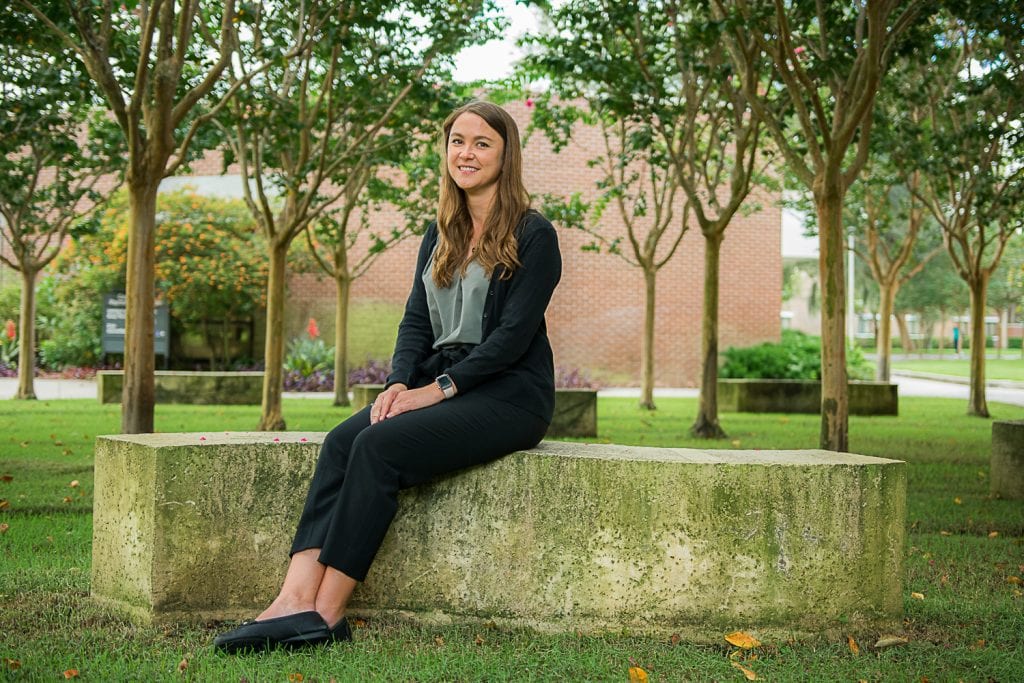New Biology Hire Brings Focus to Accessibility

A new hire in the Department of Biology amplifies the College of Sciences’ emphasis on inclusive learning.
Assistant Professor Katelyn Cooper, Ph.D., is a discipline-based education researcher identifying ways to make undergraduate biology more inclusive. Specifically, Cooper’s work focuses on revealing challenges for students with different identities and characteristics in undergraduate biology and finding ways to mitigate those challenges.
Cooper is the first hire by the Department of Biology to study inclusion and diversity in undergraduate biology, and she complements the work of other discipline-based education researchers in other College of Sciences departments.
“There are so many different factors that play into my research, so identifying inequities in college biology experiences is always difficult. But there’s a lot of satisfaction when you begin solving the puzzle,” Cooper said.
Students come into the undergraduate biology classroom with multiple identities that Cooper studies (e.g. gender, LGBTQ+ status, anxiety and depression). Cooper studies how students’ identities can affect their experience specifically in active learning classrooms and in undergraduate research experiences. This can encompass identifying challenges ranging from how students work in groups to how different cultures approach learning.
Students, especially those raised without certain advantages, often feel that they don’t fit in with others in their science courses, Cooper said. She wants people to feel like they belong in these courses, even if they are not a traditional student. Even small tweaks like professors including humor in their lectures has been shown to put students more at ease.
“The little tweaks to our classrooms can make such a difference. Even something like using name tents, or pieces of card stock with a student’s names written on it, in a large lecture can make students feel less invisible. That is our goal. That is how we want every person in the classroom to feel — like they are seen,” said Cooper.
Before coming to UCF, Cooper conducted research as a postdoctoral scholar at Arizona State University. Historically, her work focused almost exclusively on the experiences of students at large research-intensive institutions. However, she is excited about expanding her work to other types of institutions, such as community colleges.
“I’ve been very thoughtful about the fact that some of our previous findings may hold true in a particular situation, but may not translate to another context. That is why I am so excited to be working here at UCF, and conduct even larger scale studies,” said Cooper. “The ultimate goal of my research is to change the lives of the students on (and off) campus.”
What drew Cooper to UCF across the country from Arizona State University (ASU) was the opportunity and potential she saw within the school.
“I am so impressed by UCF’s commitment to undergraduate science students’ education. There is a very vibrant team of discipline-based education researchers who have been hired throughout the science departments that work to improve the learning experiences of undergraduates across science. Because UCF values inclusivity and diversity so much, they are willing to take those extra steps to create a community of researchers focused on improving education in across scientific disciplines. I wanted to be a part of that team” said Cooper.
Cooper adds to a team of discipline-based education researchers in the College of Sciences including Physics Assistant Professor Jackie Chini, one of three professors who used a $300,000 grant from the National Science Foundation (Project ACCESSS) in 2016 to study the experiences of students with disabilities in active learning physics and chemistry courses.
“Postsecondary STEM education has been focused on active learning to improve student outcomes for quite some time, and UCF is at the forefront of exploring this area,” Chini said.
Collectively, they fit UCF’s bigger picture of inclusive learning and research.
Interim Chief Equity, Inclusion and Diversity Officer S. Kent Butler, Ph.D., said UCF’s commitment to an open, diverse and supportive environment is reflective of tenets espoused in Dr. Martin Luther King Jr.’s article The Purpose of Education. In 1947, King wrote that “Education must enable a man to become more efficient, to achieve with increasing facility the ligitimate (sic) goals of his life.”
“Using the life experiences of students to construct a resourceful learning environment designed to breakdown educational barriers is a phenomenal way to meet students in their space and support their growth as scholars,” Butler said.
